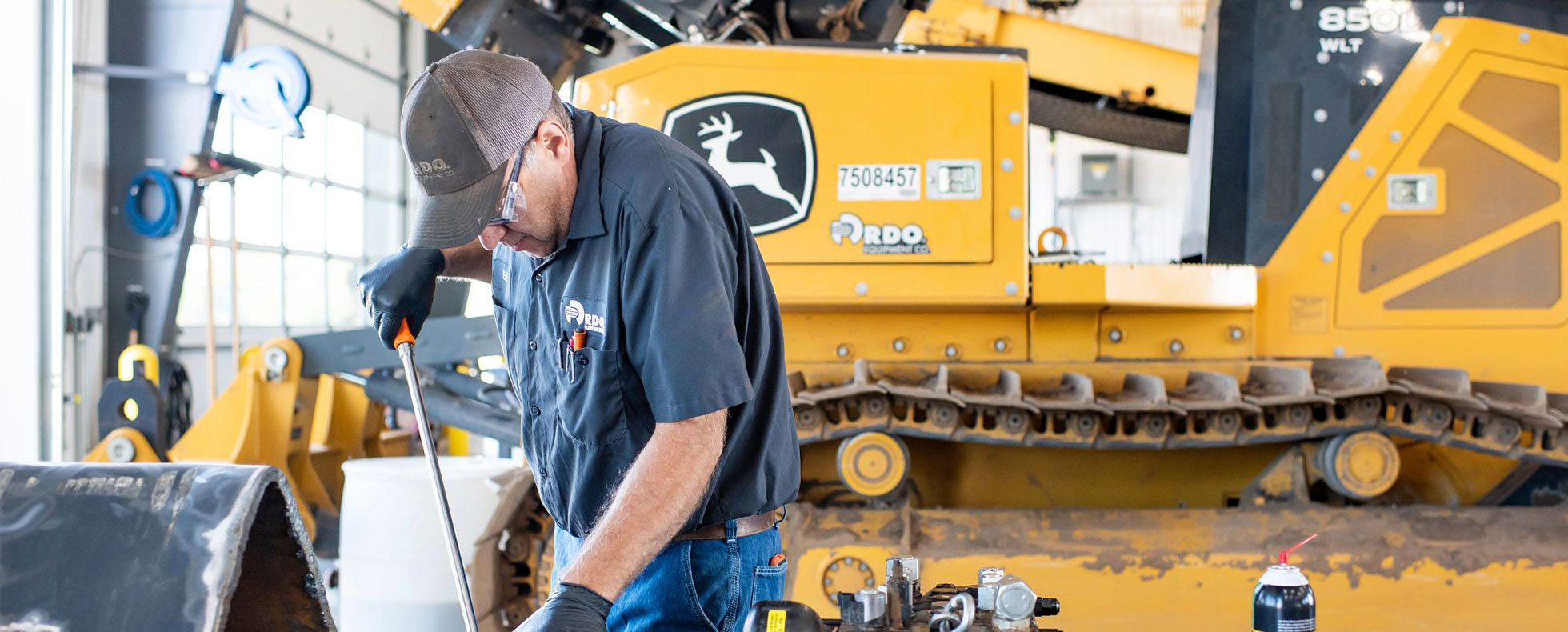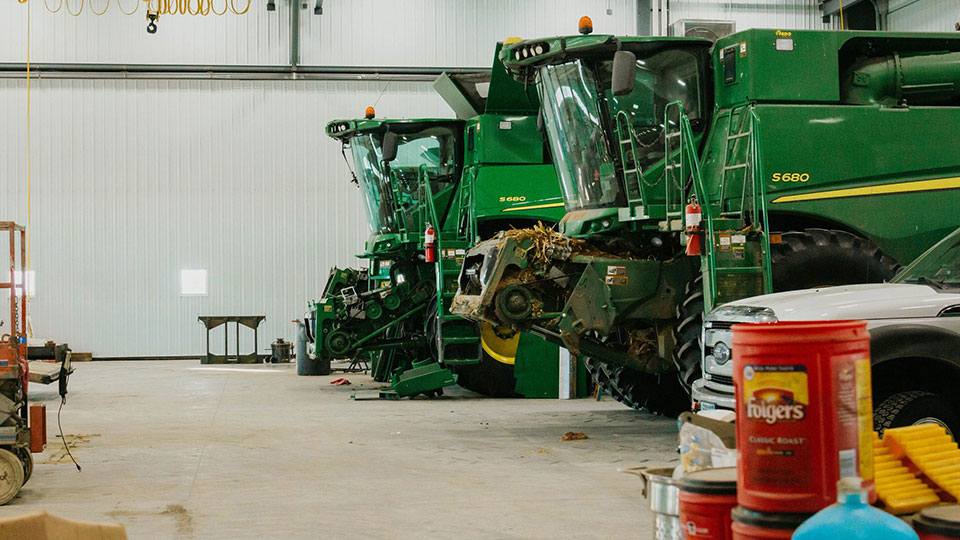
Everyone deserves to love their career. As the place where you spend much of your day, your work can often set the pace for the rest of your life.
Becoming a diesel technician might be worth considering as you look for your best-fit career path — especially if you love working with your hands.
RDO Equipment Co. employs service technicians in more than 80 locations across 12 states. While a diesel technician’s job might change slightly from one location to another (depending on the equipment they work on, the composition of their shop, etc.), every technician impacts our organization, our customers and the communities we serve. For many, this can be a really rewarding career. At this point you might be wondering, what does it mean to be a diesel technician?
More importantly, is this career right for you?
In this article, you’ll learn more about what a diesel technician is, what kind of things diesel technicians are responsible for and what common challenges the people in these positions face. That way, you’ll have a better understanding of what being a diesel technician could mean for your career.
A diesel technician is responsible for inspecting, maintaining and fixing diesel-powered machinery and equipment. Also called diesel mechanics or diesel service technicians, diesel technicians diagnose issues and repair a variety of equipment, including construction and agriculture machinery, class eight semi-trucks, buses and (commercial) generators.
Like many other jobs, one day in a diesel tech’s life doesn’t mirror the next. The cool part about this job is that you are always working on something new, whether it’s an entirely different piece of equipment or another mechanical element.
Generally, diesel technicians are responsible for these main categories of work tasks:
Whether they work for a dealership (like RDO Equipment Co.) or at a business that uses a lot of diesel equipment, like a construction or trucking company, a diesel mechanic's primary responsibility is to amend any issue that crops up with a piece of equipment.
When machinery rolls into their shop, diesel technicians are asked to fix it.
This might include repairing fuel systems (injectors, fuel lines, tanks, etc.), fixing engine components or replacing vehicle parts.
Record keeping is another major part of a diesel tech’s job. Though you might not think about it initially, clean record keeping (recording what jobs were completed, what work was done, what parts were changed, which fluids were used, etc.) is crucial to every shop’s success.
Record keeping is a joint effort. As the party performing the work, however, a diesel mechanic is one of the most important stakeholders in keeping documentation well-maintained. Expect to spend time “writing the story” of your work on every piece of equipment.
Without proper maintenance, diesel-powered equipment and machinery can become a hazard. This is especially true of self-propelled machinery like tractors, combines, backhoes, semi trucks and bulldozers.
Diesel service technicians are responsible for regularly inspecting vehicles and machinery to ensure engines and components are in great condition and ready for safe operation.
Every piece of diesel machinery — just like the car you drive — requires regular upkeep. Diesel technicians maintain equipment to keep it poised for top performance. Whether it's cleaning an engine, replacing lights, swapping filters or fixing things like windshields or bulges, expect to perform routine maintenance tasks as a diesel technician.

Sign Up: Service Technician Monthly Newsletter
Become a more profitable, successful mechanic with insights and resources sent to your inbox every month.
As you may suspect, being a diesel technician can be a rewarding career, both in compensation and job satisfaction.
It’s hard to overstate the value diesel technicians bring to their organization. In fact, these workers make a direct impact on the revenue streams of the companies they work for. In the case of RDO Equipment Co., our technicians make a measurable impact on every aspect of our business and are a key contributor to our growth.
Regardless of where you work as a mechanic, you’ll feel fulfilled by the obvious impact of your efforts.
On a more macro level, diesel technicians keep every supply chain they touch on track. For example, suppose you spend your day getting a John Deere utility tractor up and running. Upon completion, you can walk away knowing your efforts will have a ripple effect — unlocking agricultural production that will benefit your community.
The diesel mechanic trade, like all others, has a few potential challenges you should be aware of. It’s important you know what you’re getting into if you decide to pursue a career as a mechanic.
Here are some common challenges you may encounter as a diesel technician:
You’ll find working in a maintenance setting dirtier than working in other places. Due to the nature of the work (working on heavy equipment and diesel engines), expect to get dirty every day as a diesel technician. Grease, oil, dirt and debris are ever-present in this industry.
It’s worth noting, however, that not every shop is the same. Many companies practice good work-environment hygiene, routinely have their shops cleaned and facilities updated. That said, if you’d prefer not to shower at the end of your work day, this won’t be the right career path for you.
Diesel technician jobs can also be hard on the body. This is certainly a physically demanding field. You’ll regularly need to lift heavy objects like tools and mechanical components, stand for long periods and put your body into “awkward” positions to perform work. For example, it’s not uncommon for diesel techs to inspect equipment from all angles, forcing them to crane their necks or lie on the ground.
Like all jobs, life as a diesel technician can be stressful at times. Inspecting, diagnosing and repairing equipment efficiently is the name of the game within service shops. As a result, when there are a lot of jobs to complete, a diesel technician may start to feel this pressure.
While great employers have systems in place to mitigate burnout and job-induced stress, there are high-pressure moments in the diesel technician field. This pressure ebbs and flows depending on how busy the service shop is and how long jobs take to complete. In the late spring through summer, for instance, dealerships in states like Minnesota and North Dakota see their workloads increase, raising this pressure.
Related Article: 7 Common Challenges a Diesel Technician May Encounter on the Job
There are a lot of upsides to being a diesel technician, including the work-life balance you can establish and the variety of equipment you get to work on.
Perhaps most importantly, however, diesel technicians get to see the fruits of their labors firsthand — the work they do makes a visible impact on their company, their customers and the world around them.
If you’re considering a career as a diesel tech, though, don’t forget that you will have to deal with the dirt and grime accompanying this field. You’ll also find that this job isn’t as easy on the body as something less physically demanding.
Should you choose to pursue it, you’ll find working as a diesel technician to be a great career full of advancement opportunities, professional growth and professional fulfillment.
Now that you have a basic overview of what a diesel technician does and what a job in this field may look like, we’d love to help you take the next step.
If you’re a student looking to take the next step into the equipment service world, check out our Access Your Future internship opportunities.
If not, your next step is to watch these videos to learn more about this career path directly from RDO service technicians.
If you have any questions about RDO Equipment Co. or would like some information on how to get started on your diesel technician path, contact us. We’re more than happy to help you take the next great step in your career journey!